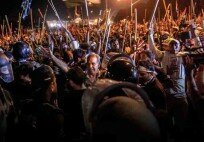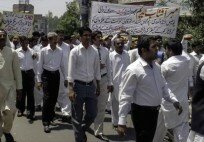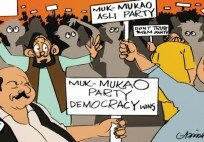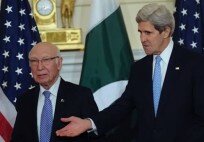By Afzal A Shigri -
While the state of Pakistan is locked in an existential battle with terrorists, the attention of the country is focused on a proposed law namely the Pakistan Protection Ordinance, 2013, which has become a hotly debated topic in the electronic media.
The promulgation of this law, which has been bulldozed through and passed by the National Assembly, is now before the Senate, is being criticized not only by the opposition parties but also by the civil society as well as the organizations working on human rights. The impression is that unbridled powers are being given to the law enforcement agencies to detain, and shoot at sight anyone they suspect to be a terrorist.
Briefly, the issues that are being highlighted include use of force against any suspected person by the law enforcement agencies, preventive detention of suspects and remand for 90 days, establishment of Special Courts and the transfer of the burden of proof upon the accused to establish his innocence during the trial.
A close examination of the existing substantive laws namely Criminal Procedure Code and Pakistan Penal Code and special laws shows that most of the provisions of PPO already exist in these laws and nobody seem to have even taken the pain to examine them. The following will highlight the legal provisions that are on books and that have been implemented for many years.
Much orchestrated criticism of use of force including firing is provided in Pakistan Penal Code in the Chapter “of right of private defense” in Sections 96 to 106 that cover this aspect in detail. This allows the private citizen as well as any member of the law enforcement agencies to “voluntary causing a death of or any other harm to the assailant”, if there is a reasonable cause of the apprehension of death, grievous hurt, rape, kidnapping or wrongful confinement.”
These powers are more comprehensive than the provisions of Pakistan Protection Ordinance that, on the contrary, restrict the existing powers of law enforcement agencies by making the use of force subject to prior warning as far as possible to the culprit thus exposing the former to danger. The issue of preventive detention is also irrelevant because Section 11(eee) of Anti Terrorism Act, 1997 provides for a preventive detention/remand for 90 days, which is the period that has been also laid down in Maintenance of Public Order Ordinance.
The constitution clearly lays down three categories that allow the Government to resort to preventive detention in varying circumstances from 8 to 12 months, and in case of ‘an enemy alien’ the provision of this article are not applicable. Such a person can be detained for indefinite period. The proposed PPO or other enactments are only enabling laws to define the parameters for action under the constitutional provisions. Section 5(5) of PPO has specifically defined an alien waging war against the state so that appropriate action could be taken for the detention of the suspect.
Special courts already exist to try cases under anti terrorism laws, and no one has objected to establishment of these special courts. PPO has placed burden of the proof on the accused and amends evidence law, but similar provisions are also available in the Anti Terrorism Act, 1997. In section 27A, if a person is found in possession of an explosive material or an explosive device it will be presumed that it was for the purpose of terrorism. It in effect transfers the burden of proof upon the accused.
A further critical examination of the score of laws dealing with these matters will show that PPO is yet another parallel legislation that is only adding confusion to a very complex legal structure in the country. It only opens up opportunities for corruption at the operational level and makes the task of the well meaning and honest officers at supervisory level. A few amendments in the existing law would have covered any additional aspects that are addressed in the PPO. The proposed law has only given rise to avoidable controversy without serving any purpose.
If the ministries concerned have enacted this law to meet the challenges of terrorism in the country, it is a demonstration of their incompetence, which continues to create difficulties for the sitting government. If the purpose is to divert the attention from other issues, it is a master stroke of political manoeuvring that has caught the imagination of the confused media and the civil society allowing other vital issues to recede into the background.
However, there is a case to revisit the Anti Terrorism Law in this country and to re-examine its basics so that the misuse of this law and the prosecution of irrelevant persons who have nothing to do with hardcore acts of terrorism without impact on terrorism in the country can be prevented. On the contrary, it diverts the attention of the law enforcement agencies and the courts from the key factor that is threatening the very existence of the country. The most important section of the anti terrorism law is the definition of the ‘terrorism’ on which the entire edifice of the anti terrorism law is built. A reading of the text shows that it is open ended.
Therefore, all and sundry except the terrorists, are being prosecuted under the anti terrorism law. We have the dubious distinction of applying the anti terrorism law to the police personnel, members of the law enforcement agencies, common citizens, politicians, civil servants, ministers, even the Prime Minister and the President.
There is a pressing need to deal with the issue confronting this country in order to restore peace and establish the rule of law. Unusual situations call for extraordinary steps by the sitting government that has the sole responsibility to maintain peace. It is bound to enact new laws to address situations that may not be very popular politically.
All over the world, special laws have been promulgated to deal with terrorism and insurgencies, and the inherent powers for legislation cannot be challenged on the matters that bring peace. In many cases, these laws do not conform to the high bench mark of fundamental rights of the citizens, but in the greater interest of the society compromises are made even in most advanced democratic countries. The need, however, is to ensure the law is not misused and only holds people to account who challenge and violate the writ of the state and endanger the lives of the innocent citizens.
If the fears of the common man regarding PPO are to be addressed, it is imperative that the loose definition of terrorist acts in the existing laws are made more specific and internationally accepted parameters are applied in this case. Internationally accepted definition of terrorism refers to a “strategy of using violence, social threats or coordinated attacks, in order to generate fear, cause disruption, and that ultimately bring compliance with specific political, religious or ideological demands”.
The European Union includes in definition of terrorism the aim of “de-stabilizing or destroying the fundamental, constitutional, economic or social structure of a country”. In United States, the code of Federal Bureau of Investigation has defined terrorism as “the unlawful use of force and violence against persons or property intimidate or coerce a government, civilian population or any segment thereof, in furtherance of political or social objectives.”
Contrary to these internationally recognized and accepted bench mark, the definition of the terrorism in Ordinance of the Anti Terrorism Act, 1997 makes an exemption in sub clause 3 of this section and states that any act of terrorism will also apply to any of the offences defined in this law if firearms or explosives or any other weapons are used. The condition of the “use or threat made for the purpose of advancing a religious, sectarian or ethnic cause” is not binding.
This inherently flawed definition of terrorism is posing serious challenges to the whole criminal justice system in the country. The misuse of the Anti Terrorism Law that is dreaded by the opposition parties and the civil society is obvious from the recent cases registered and prosecuted under Anti Terrorist Act effectively empowering the Government and the law enforcement agencies to indiscriminately apply the Anti Terrorism Law.
It is also fashionable to apply this law in any case that attracts the attention of the media. We have the example of application of terrorism laws to hundreds of cases that are essentially felony and must be dealt by the normal courts.
It has created a requirement of additional Anti Terrorism Courts thus creating a parallel judicial system with a devastating impact on the entire law enforcement structure. These courts for various reasons have been unable to convict the real terrorists where collection of evidence is extremely difficult. The outcome of this distortion is that the cases of normal nature are tried and the culprits convicted in order to ensure the disposal of “terrorism cases.”
If the opposition is really serious in addressing these problems, it should revisit the entire Anti Terrorism Law and where it finds any gaps, new sections can be added and where certain portions of the laws are being misused, it should be amended to meet the internationally accepted benchmark of justice and fair treatment of the people involved in various cases of common nature.
This will not only help in improving the system but will also create a very positive environment for dealing with terrorism effectively. The Government should also reconsider withdrawal of this law, and in consultation with the opposition collectively address the problems of distortion of the present law and come up with additional amendments that would effectively stem the tide of terrorism in the country and ensure lasting peace without fear of its abuse.
The writer is a Former Inspector General of Police
































































































Recent Comments